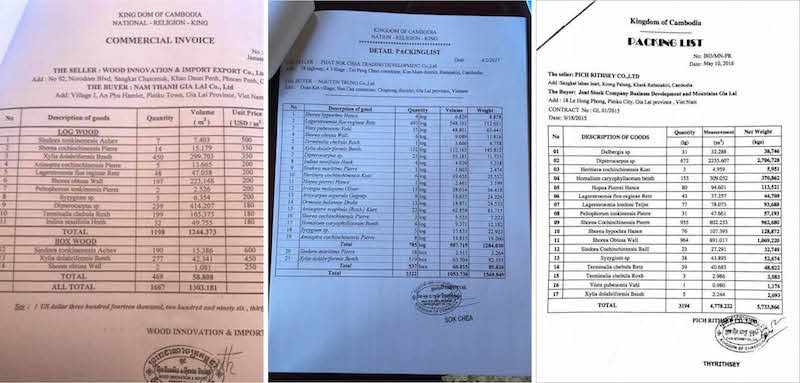The U.K. NGO that last week exposed a major new timber trafficking operation between Cambodia and Vietnam has released more evidence in hopes of supporting Phnom Penh’s investigation into its claims, including invoices from Cambodia-based companies breaking the country’s timber export ban.
Using undercover teams, the Environmental Investigation Agency (EIA) found Cambodian authorities in Ratanakkiri province colluding with Vietnamese companies to illegally log protected areas on an industrial scale and smuggle the timber across the border, in breach of a blanket ban on timber exports to Vietnam that has been in place since early last year.

EIA estimates that at least 300,000 cubic meters of timber worth about $75 million made it across the border during the latest dry season, helped along by millions of more dollars in bribes on either side.
The report corroborates Vietnamese customs data— which shows timber continuing to flood across the border—that Cambodian authorities have been denying since the export ban took effect. After taking a few days to digest the report, Environment Minister Say Sam Al said on Sunday that an investigation into EIA’s claims was underway.
Yesterday, EIA posted a trove of additional evidence to its website to aid the government’s efforts.
“Cambodia can use this information to put an end to the denials issued by some government officials that the trade is even occurring,” Jago Wadley, EIA senior forest campaigner, said by email. “The information will be of use in a targeted investigation on the ground, and can clearly inform a formal request of Vietnam to disclose information it holds on the trade.”
The new evidence includes: copies of Vietnamese government records giving 16 of the country’s companies permission to fill a 300,000 cubic meter quota with Cambodian timber; official Vietnamese customs records detailing its imports; customs and tax documents
for specific shipments; and a few sales invoices and packing lists. There are also GPS coordinates for the Vietnamese timber depots EIA visited just across the border and satellite images published in its report.
Most of the records are in Vietnamese. But a few are in English. They include invoices and packing lists from three Cambodia-based companies supplying buyers in Vietnam.
The three companies are Wood Innovation & Import Export, Phat Sok Chea Trading Development, and Pich Rithsey.
None of the companies are currently registered with the Commerce Ministry, and none could be reached for comment. Two of them list addresses in Ratanakkiri matching the records published by EIA.
Wood Innovation lists a Phnom Penh address that is currently under construction. That address used to house the Cambodian headquarters of the Vietnam Rubber Group, the local representative of several state-owned Vietnamese rubber companies with plan- tations in Ratanakkiri.
The Rubber Group has since moved to a new Phnom Penh address. An accountant for the group contacted yesterday, Kum Lida, said she had never heard of Wood Innovation, or either of the other two Cambodian-based companies in the records published by EIA.
Mr. Sam Al, the environment minister, said he was not aware of the new evidence. He said he would look at it, but declined to say anything else about the government’s investigation of EIA’s claims.
“We have to look into every- thing in detail,” he said.
Mr. Wadley, of the EIA, said Cambodian authorities should start making arrests and pressing charges if its investigation is to be taken seriously.
“Laws have been broken on a major scale and any government worth having would demonstrate that rule of law applies by applying the rule of law,” he said.
“Cambodia’s government now has a fantastic opportunity to demonstrate it can and will apply the law fairly and judiciously in response to irrefutable evidence of lawless- ness facilitated by government corruption,” he said.
If Prime Minister Hun Sen’s government fails to take that opportunity, “it will look like it is either incompetent or involved,” he said.
Environmental activist Ouch Leng, who has investigated the recent illegal logging in Ratanakkiri himself, was skeptical that any ranking officials or oknhas—an honorific the government bestows on wealthy Cambodians in return for donations to the state—behind the logging operation would suffer.
“Authorities arrest the poor people only, but the oknhas and powerful people involved in forest crimes are not arrested and always get protection,” he said. “I don’t think the government will arrest the oknhas who do the illegal logging and smuggle timber to Vietnam because it would involve many high-ranking government officials.”
When a large illegal logging operation in Ratanakkiri was uncovered by the World Bank in 2005, nearly a dozen local officials received hefty prison sentences.
But many of them were tried in absentia and never caught. One of them, a former provincial governor, was recently pardoned at the prime minister’s request. He did not serve a single day in prison.
Sol Noeuy, who lives in Andong Meas district’s Talav commune, near one of the sites where EIA found Vietnamese logging activity, said yesterday that fellow villagers searching for firewood came across Cambodian and Vietnamese loggers still working in the area a few weeks ago.
“The loggers told our villagers that…the logs were being transported to Vietnam,” he said.
Like Mr. Leng, Mr. Noeuy said he has little hope of seeing any of the logging ringleaders behind bars.
“I think the government will not arrest the loggers or the people involved because the crime has been going on for a long time,” he said. “They always protect the loggers.”